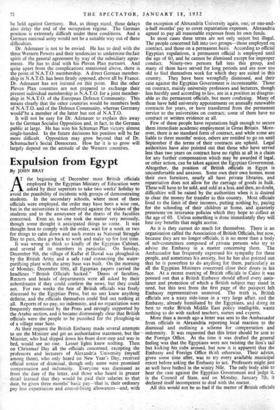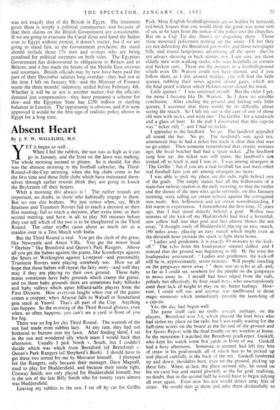Expulsion from Egypt
By JOHN BRAY
T the beginning of December most British officials employed by the Egyptian Ministry of Education were asked by their superiors to take two weeks' holiday to avoid the possibility of incidents with groups of demonstrating students. In the secondary schools, where most of these officials were employed, the order may have been a wise one, but in the universities it was enforced against the wishes of the students and to the annoyance of the deans of the faculties concerned. Even so, no one took the matter very seriously, though some thought it anticipated things to come. It was thought, best to comply with the order, wait for a week or two for things to calm down and such events as National Struggle Day to pass, then go back to work and make up for lost time.
It was wrong to think so kindly of the Egyptian Cabinet, and several of its members in particular. On Sunday, December 9th, the village of Kaffar ei Davial was ploughed-in by the British Army and a safe road connecting the water- purifying plant with the army base was built. On the morning of Monday, December 10th, all Egyptian papers carried the headlines " British Officials Sacked." Deans of faculties, Rectors and heads of departments were all asked by their subordinates if they could confirm the news, but they could not. For two weeks the fate of British officials was freely discussed by the Egyptian Press, but no one knew anything definite, and the ,officials themselves could find out nothing at all. Reports of no pay, no indemnity, and no repatriation were frequently mentioned by the and strongly supported by the Arabic section, and it became distressingly clear that British officials were the people to be punished for the ploughing-in of a village near Suez. At 'their request the British Embassy made several attempts to see the Minister and get an authoritative statement, but the— Minister, who had slipped down his front door-step and was in bed, would see no one. Lesser lights knew nothing. Then on Christmas' Day all the officials concerned, excepting the professors and lecturers of Alexandria University (myself among them), who only heard on New Year's Day, received official notice of dismissal, though only some were promised compensation and indemnity. Everyone was dismissed as from the date of the letter, and those who heard in greater detail learned that they would be paid their salaries to that date, be given three months' basic pay—Ithat is, their ordinary pay less expatriation and cost-of-living allowances—and, with the exception of Alexandria University again, one or one-and- a-half months' pay to cover repatriation expenses. Alexandria agreed to pay all reasonable expenses from its own funds.
In most cases these terms are not only unjust but illegal. The people concerned fall into two groups--those employed on contract, and those on a permanent basis. According to official Egyptian regulations, a permanent official is employed until the age of 60, and he cannot be dismissed except for improper conduct. Ninety-two persons fall into this group, and many of them have served for long periods and are now too old to find themselves work for which they are suited in this country. They have been wrongfully dismissed, and their case against the Egyptian Government is incontestable. Those on contract, mainly university professors and lecturers, though less harshly used according to law, are in a position as disagree- able as the permanent officials, but more confusing. Many of them have held university appointments on annually renewable contracts for years, or have transferred from the permanent service to the universities on contract; some of them have no contract or written evidence at all.
Few of these people have reputations high enough to secure them immediate academic employment in Great Britain. More- over, there is no standard form of contract, and while some are liable to three months' notice, others are entitled to go, on until September if the terms of their contracts are upheld.. Legal authorities have also pointed out that those who have served less than two years on contract have no rights at all in a claim for any further compensation which may be awarded if legal, or other action, can be taken against the Egyptian Government. Altogether, the position of British officials in Egypt is uncomfortable and anxious. Some, own their own homes, most their own furniture, nearly all have private libraries, and repatriation does not allow for the carriage of goods in bulk. These will have-to be sold, and sold at a loss, and then, no doubt, difficulties will be raised by the authorities when it is desired to clear the money for transfer to this country. Most officials lived to the limit of their incomes, putting nothing by, paying for the schooling of their children at home, and quarterly premiums-on insurance policies which they hope to collect at the age of 60.. Unless something is done immediately they will lose any benefits that might accrue.
As it is they cannot do much for themselves. There is an organisation called the Association of British Officials, but now, because they are no longer officials, it is no more than a body of sub-committees composed of private persons who try to advise the Embassy in a matter concerning them. The Ambassador has frequently expressed his sympathy for these people, and sometimes his anxiety, but he has also pointed out that he is powerless to do anything for them, particularly as all the Egyptian Ministers concerned close their doors in his face. At a recent meeting of 13ritish officials in Cairo it was pointed out that a British Embassy should afford every assis- tance and protection of which a British subject may stand in need, but this- text from the first page of the passport left Embassy representatives unmoved. The truth is, British officials are a nasty side-issue in a very large affair, and the Embassy, already humiliated by the Egyptians, and doing its best to make British Middle East policy intelligible, wants nothing to do with sacked teachers, nurses and experts.
More than a month ago a letter was sent to the Ambassador from officials in Alexandria reporting local reaction to the dismissal and outlining a scheme for compensation and -indemnity. It was requested that this letter should be sent to the Foreign Office. At the time it was drafted the general feeling was that the Egyptians were not twisting the lion's tail but kicking his cubs around, but now it is apparent that the Embassy and Foreign Office think otherwise. Their advice, given some time after, was to try every available municipal resort before asking the Embassy to act. Professors might just as well have bathed in the wintry Nile. The only body able to hear the case against the Egyptian Government and judge it, is the Council of State, and on Monday, January 7th, it declared itself incompetent to deal with the matter. All this would not be so bad if the matter of British officials was not exactly that of the British in Egypt. The treatment given them is simply a political consequence, and because of that their claims on the British Government are considerable. If we are going to evacuate the Canal Zone and hand the Sudan over to Egypt without protest, it doesn't matter, but if we are going to' stand fast, as the Government proclaims, the stand should ,include those 176 men and women who are being penalised for political ineptness on both sides. The Egyptian Government has dishonoured its obligations to Britain and to Britons, and it has made the future of the Middle East anxious and uncertain. British officials may by now have been paid the part of their December salaries long overdue—they had not at the time I left on January 8th—and the Minister of Finance wants the three months' indemnity settled before February 4th. Whether it will be or not is another matter,"but the officials demand just compensation—they have prepared a scheme for this—and the Egyptian State has £250 million in sterling balances in London. The opportunity is obvious, and if it were approved it would be the first sign of realistic policy shown in Egypt for a long time.



































 Previous page
Previous page